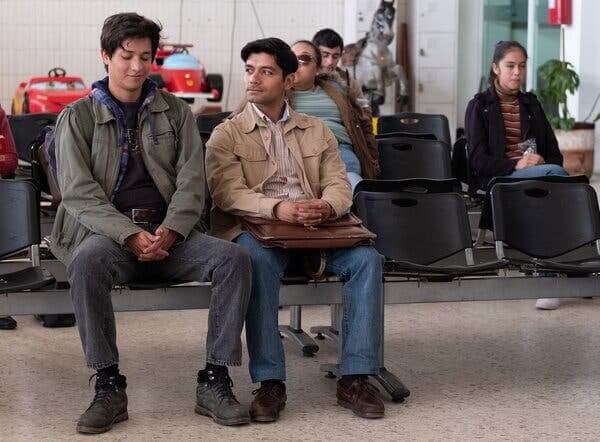I CARRY YOU WITH ME (Te Llevo Conmigo)
(director/writer: Heidi Ewing; screenwriter: Alan Page; cinematographer: Juan Pablo Ramírez; editor: Enat Sidi; music: Jay Wadley; cast: Armando Espitia (Ivan),Christian Vazquez (Gerardo), Michelle Rodríguez (Sandra), Ángeles Cruz (Rosa Maria), Raúl Briones (Marcos), Arcelia Ramírez (Magda), Pascacio López (Cesar), Michelle González (Paola), Luis Alberti (Cucusa)); Runtime: 111; MPAA Rating: R; producers; Mynette Louie, Heidi Ewing: Sony Picture Classics; 2020-Mexico/USA-in Spanish, English with English subtitles)
“The love story though evocative seems forced and overreaching.”
Reviewed by Dennis Schwartz.
Documentarian Heidi Ewing (“Jesus Camp”/”One of Us”) directs this engaging but troubling love story about two gay Mexican immigrants that’s told in a messy non-linear way, as it veers back and forth in time (between three time periods) and awkwardly moves between realism and romanticism. It’s co-written by Ms. Ewing (a white woman from the midwestern suburbs) and Alan Page. Though based on a true story, it’s still considered as Ewing’s narrative feature debut. The social conscience love story is aimed for its target progressive audience, who should be sympathetic to the plight of gay lovers who are illegals.
It’s filled with ideas of humanism that don’t seem to be reconcilable with the reality of America softening its hard-line stance on illegals, as it attempts to stretch the American Dream to Mexicans who might be suffering from poverty, bigotry or homophobia and yearn for the same dear things their neighbors do. It shows people all over the world share common humanitarian needs. Nevertheless it fails to make its case why illegals think they have the right to break the law to be in America.
Gerardo (Christian Vazquez) is an openly gay veteran college teacher in Puebla City, Mexico, from a tolerant well-off family. He meets the closeted gay Ivan (Armando Espitia), from a working-class family and a homophobic father, at an underground gay bar in 1994, where they both fall in love at first glance. The aspiring chef Ivan, apprenticed at the best culinary schools in Mexico, nevertheless still can only get work as a dish washer.
Ivan is separated from his bitter wife (who doesn’t know he’s gay) and the young son he loves. His childhood friend Sandra (Michelle Rodriguez) helps console him with his many problems. To get money, Ivan goes illegal and believes he must “cross over” to the United States, which he does coyote-assisted. He lands in NYC looking for a restaurant job. His good intentions are to send money back to Mexico for his son, and perhaps eventually return to his beloved Mexico. He’s saddened when Geraldo turns down his offer to join him, as he finds his early days in the Big Apple rotten.
Sandra ends up living with Ivan in the outer borough of Queens, where he can only get dead-end jobs washing cars and delivering food, and lives in constant fear of being deported.
The film is incoherent in its movements over different time periods, such as the childhood period confusingly bumping into the future period.
It does itself proud by its great location shots by DP Juan Pablo Ramírez and evokes sympathy for the illegal that over his plight he’s willing to risk his life to make a better life for himself.
The film’s big surprise is revealing the documentary footage Ewing has from 2012, showing the real lovers when they have reunited in NYC decades later. Ivan now owns a restaurant, but is glum he hasn’t seen his son in twenty years. He fears that if he returns to Mexico because of his illegal status he will never be allowed to return to America. While Gerardo isn’t interested in going back to Mexico, as he doesn’t want to leave everything he now has built up here.
The film ends on an open-ended note, as we’re not sure what will happen to either illegal in the future.
The fresh LGBTQ story makes for a troubling watch (as the love story though evocative seems forced and overreaching–I still don’t know these guys despite hearing their life story). Also, no matter how well-intentioned it has no remedies for today’s America, where even legal immigration has become a dirty word for many Americans. I have little doubt the film would have worked better as a conventional documentary, because it shines best when it’s in a documentary mode.
It won both prizes awarded in the Next and Audience categories of the 2020 Sundance Film Festival.

REVIEWED ON 7/10/2021 GRADE: B-